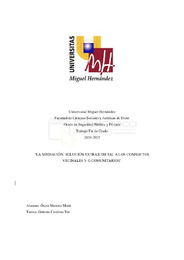Resumen :
La mediación es un sistema adecuado de resolución de conflictos. Se trata de una vía
extrajudicial, voluntaria, alternativa y confidencial, a través de la cual las partes pueden
acudir de forma voluntaria para tratar de llegar a una solución de un conflicto. En relación
a ello, se encuentran dos tipos de mediación: la mediación vecinal y la mediación
comunitaria. La mediación vecinal se desarrolla en el contexto de una comunidad de
copropietarios o de vecinos, o en un mismo barrio, constituida a tenor de lo dispuesto en
la Ley de Propiedad Horizontal. La segunda, tiene un ámbito de aplicación más amplio,
y envuelve problemas de carácter social y cultural. En cualquier caso, ambas se
caracterizan por tener implicaciones sociales y culturales muy relevantes, que afectan al
desarrollo del proceso. Por ello, en todos los casos alcanzar una solución de forma
voluntaria, es muy importante para garantizar el cumplimiento de este acuerdo y la buena
convivencia en un futuro.
En relación a lo expuesto, a lo largo del presente trabajo, se abordará la mediación vecinal
como una solución extrajudicial a los conflictos de esta índole, exponiendo su
funcionamiento, los actores que intervienen y las distintas fases del proceso.
En suma, se abordarán las ventajas que este sistema de resolución de conflictos presenta,
especialmente en comparación con otros tipos de procesos como la vía judicial o el
arbitraje y muy concretamente en el ámbito vecinal, en el que se encuentra este trabajo
Finalmente se pondrán de manifiesto algunos ejemplos y casos de otros países de nuestro
entorno donde se desarrollan mediaciones vecinales.
Mediation is an appropriate system of conflict resolution. It is an out-of-court, voluntary,
alternative and confidential way in which the parties can come together voluntarily to try
to reach a solution to a conflict. There are two types of mediation: neighbourhood
mediation and community mediation. Neighbourhood mediation takes place in the
context of a community of co-owners or neighbours, or in the same neighbourhood,
constituted in accordance with the provisions of the Horizontal Property Law. The second
has a broader scope of application, and involves problems of a social and cultural nature.
In any case, both are characterised by very relevant social and cultural implications,
which affect the development of the process. Therefore, in all cases, reaching a solution
voluntarily is very important to guarantee compliance with this agreement and good
coexistence in the future.
In relation to the above, this paper will deal with neighbourhood mediation as an
extrajudicial solution to conflicts of this nature, explaining how it works, the actors
involved and the different phases of the process.
In short, the advantages of this system of conflict resolution will be discussed, especially
in comparison with other types of processes such as judicial proceedings or arbitration,
and very specifically in the neighbourhood sphere, where this work is located.
Finally, some examples and cases of other countries in our environment where
neighbourhood mediations are developed will be highlighted.
|
 La licencia se describe como: Atribución-NonComercial-NoDerivada 4.0 Internacional.
La licencia se describe como: Atribución-NonComercial-NoDerivada 4.0 Internacional.
.png)
